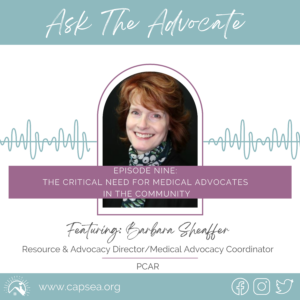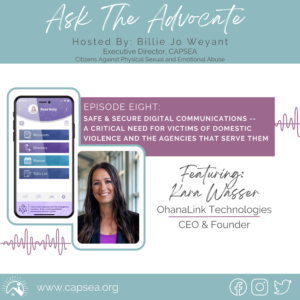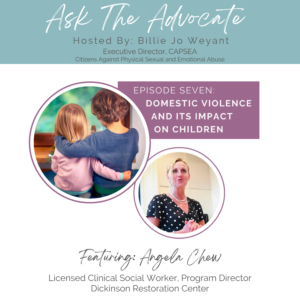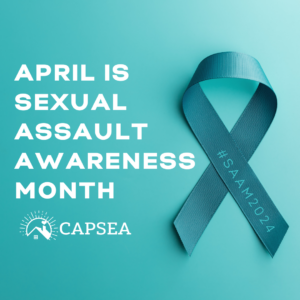Ask the Advocate Podcast: Episode 6
When Celebrity Abuse Makes Headlines
Featuring: Michelle Cooper from the Pennsylvania Coalition Against Domestic Violence (PCADV)
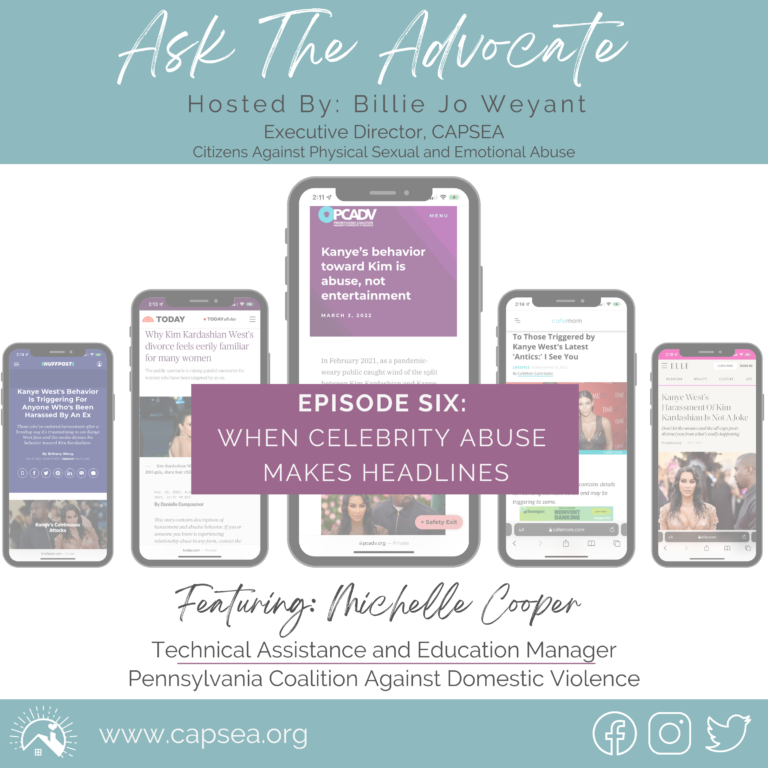
"Let's think about the folks who are watching this play out...Those who are experiencing abusive behavior and watching a woman with so many resources still unable to disconnect from a past partner. Those things are really scary."
about the Episode
Abuse allegations in the headlines can be be a triggering experience for survivors. Billie Jo and Michelle reflect on the damaging messages that the Kim Kardashian and Kanye West divorce drama is sending to victims of abuse, and to young people still exploring the dynamics of healthy vs. unhealthy relationships. As the world watches these real time examples of emotional abuse and harassment, this podcast focuses on the potential awareness opportunities and what they would like victims to know.
Michelle Cooper works with the Pennsylvania Coalition Against Domestic Violence (PCADV), which is the oldest statewide domestic violence coalition in the nation. Each year, its network of 59 local domestic violence programs provides free and confidential direct services to nearly 90,000 victims and survivors of domestic violence and their children in all 67 counties of the Commonwealth. Together, local programs and the statewide Coalition work in collaboration to deliver a continuum of services, support, and systems to help victims and survivors find safety, obtain justice, and build lives free of abuse. Learn more at www.pcadv.org.
ASK THE ADVOCATE is a podcast series featuring advocates for domestic violence, abuse, and sexual assault survivors discussing critical victim service resources. Sit down with Billie Jo Weyant and her guests each episode to discuss critical victim service resources and to help raise awareness for the most pressing challenges facing survivors and the nonprofit agencies that serve them. Watch all Ask the Advocate episodes at capsea.org.
Billie Jo Weyant (00:00):
You’re listening to Ask the Advocate, a podcast series that features advocates for domestic violence, sexual violence, and all other survivors of abuse and serious crime. I’m your host, Billie Jo Weyant. And for the past three decades, I’ve worked in the victim services industry serving as the executive director for a Pennsylvania based nonprofit named CAPSEA, which stands for Citizens Against Physical Sexual and Emotional Abuse. I invite you to join me as I sit down with my guests, each episode, to discuss critical victim service resources and to help raise awareness for the most pressing challenges facing survivors and the nonprofit agencies that serve them.
Billie Jo Weyant (00:44):
Hello everyone. And welcome to this episode of Ask the Advocate. I’m Billie Jo Weyant, Your host. I have over 30 years of experience and working with victims of abuse and survivors. And today I have with me a very special guest from the Pennsylvania Coalition Against Domestic Violence, Michelle Cooper. I wanna let you also know that PCADV as we lovingly call it, has been a leader in, uh, as a coalition and the very first coalition of the nation. And so we are the oldest and of all time and still going strong and doing wonderful, wonderful work; Not only in the Commonwealth of Pennsylvania, but also across the nation with other coalitions. And Michelle, before I go any further, I do wanna let everyone know who is watching and/or listening to this episode. We are really gonna be talking about different forms of abuse today and abuse behaviors and how those behaviors sometimes don’t come off as what people necessarily think that abusers of domestic violence should behave like and also how victims should behave.
Billie Jo Weyant (01:57):
And there’s no set way in which a victim is to behave a person in that situation survives. And that’s what they do, and they are in fear. So I think today’s, uh, episode is really going to, uh, really get into that a little bit more. And we’re gonna talk about what- how, how lethal an abuser can be. And, uh, and, and hopefully give a, a survivor who may be listening or watching this some hope and also some other options for them to reach out in their own area, and see what they may be able to do to get more assistance. So, Michelle, I’d love to turn it over to you. I want everyone to know your vast experience and what you’re doing, not only with PCADV but also what you’ve done in the past to lead you here.
Michelle Cooper (02:49):
Awesome. Thank you, Billie Jo. Um, so I’m Michelle Cooper, I’m the Technical Assistant and Education Manager at PCADV. Um, I’ve been there since 2018 and I have the privilege of, of really providing and helping the, the team at PCADV who provides, uh, training, technical assistance. And resources to all of the member programs across the Commonwealth. Um, before that I worked at one of our member programs as a human trafficking and medical advocate. Um, so I have direct service experience. Um, I’ve, I’ve had an opportunity to really, you know, work in the field for a long time. And, and that’s why I’m so excited to be able to talk about this topic today, which is, which is really looking at the situation with Kim Kardashian, Kanye West and Pete Davidson, and how that very, very, you know, front page news situation, um, you know, caught our attention at PCADV because of the dynamics that we saw unfolding.
Michelle Cooper (03:48):
So we, you know, saw this, uh, you know, when it first started last month and really started thinking about, “Well, we gotta write an article about this.” And as you and I talked about in preparation for this podcast, everything sort of keeps- keeps going. So when we first started the, the blog article that was before the music video came out, then we’re like, all right, we’re gonna amend the article so we can include that information. And of course, since we published it now, you know, things just sort of keep, keep happening, which is really, you know, identical, I think, to what we experience as advocates in a situation where, you know, a, a survivor starts to really, you know, be in need of our help and support services. Um, so I’m really excited to be on here to sort of talk a little bit about the article, talk a little bit about, you know, why we wanted to sort of put it out there in the way that we did and definitely to, to really highlight, you know, that this is a situation that clearly can happen to anyone. Um, and, and obviously the help and support that’s out there for folks.
Billie Jo Weyant (04:52):
Absolutely, Michelle. And also, I think when you and I were in our preparation phase before, you know, talking a little bit before we decide- decided on exactly what topics we were going to be talking about, how this just doesn’t affect the two individuals closely related, uh, or the two, you know, the partners, for instance, in this situation. This affects everybody. I mean, if you think about this, this is literally going international, and it’s affecting everyone. And now my concern is as a local advocate and running a local program, but looking at things on, on a bigger level and now with social media and the access people have, my big concern is, and I always say this: I sometimes feel as though we go back 30 years, and all the work that we strive to do, many times I’m so concerned that it’s gonna go back to the way it was.
Michelle Cooper (05:59):
Sure. Yeah. I, I think that whenever we see a situation like this play out, it’s, you know, we sort of think, man, you know, how- Have we, have we made progress at all, but I feel like, you know, being able to have these conversations and to look at how, you know, how folks are responding to this situation, we’re now starting to see more people really, you know, really identifying this for what it is. And, and, um, you know, so while I think we all sort of share that disappointment when we see a situation, especially one so highly publicized.
Billie Jo Weyant (06:32):
Yes.
Michelle Cooper (06:32):
And I think that was one of the things that we really wanted to highlight in the article, you know, listen, <laugh> Kim Kardashian, Kanye West, Pete Davidson; They’re celebrities, they have a ton of resources and, uh, you know, social media presence…
Michelle Cooper (06:49):
That, um, that places them in a, in a different kind of category. Um, however, whether, whether we, we need to be concerned about their safety or not. And of course, I think everyone who’s an advocate is, um, you know, the thing that we wanted to really talk about in the blog article was, you know, even if you’re not concerned for them, let’s think about the folks who are watching this play out.
Billie Jo Weyant (07:14):
Yes.
Michelle Cooper (07:15):
And the folks, you know, like you said, on social media who are take sides who are looking at this and saying, oh, I’m gonna, I’m gonna look at what Kanye’s saying. And, and now I’m getting really angry. And, you know, if I ever see Pete Davidson, I’m gonna, you know, I’m gonna do something to show my support. Um, you know, survivors, you know, folks who are experiencing abusive behavior and watching a woman, a couple with all of those resources, still unable to, to disconnect from, uh, from a, a past partner.
Michelle Cooper (07:50):
Um, you know, those things are really scary. And I think, you know, those are the things that I wanted to make sure we, we were able to write something to have this podcast asked to say, we realize it can seem discouraging mm-hmm <affirmative>, but, um, but there are those local resources available. There are still those supports available. So that folks don’t have to feel like, “Man, if Kim Kardashian can’t get out of a, a, you know, an unhealthy relationship, how, how might I ever be able to do that?” And to hopefully, like you said, offers them hope and, and support for folks who are watching this play out, going, “Man, if, if they can’t do it, I’ve got no chance.”
Billie Jo Weyant (08:28):
Definitely. And I think too, as you were speaking, I was reflecting a little more on what we had spoken about where there were some people, uh, commenting. And I did read this, and I don’t, I can’t remember offhand. It was something on Twitter or something like that. But, uh, one of the things that we, they were discussing was, you know, how wonderful that Kanye was able now to buy a home right next door to Kim.
Michelle Cooper (08:59):
Right.
Billie Jo Weyant (09:00):
And isn’t that great for the children? Not understanding that is a form of power and control.
Michelle Cooper (09:08):
Absolutely.
Billie Jo Weyant (09:09):
And that’s his subtle way of maintaining control also letting her know that she better watch her step, and it’s scary. Very scary.
Michelle Cooper (09:21):
Absolutely. And, you know, we, we sort of addressed this in the article, as well as saying, you know, this is, this is similar behavior to, you know, the, the partner who, you know, hangs out outside of someone’s work or knows somebody’s schedule. So, “Oh, I know that they’re gonna take the kids to, you know, to soccer and then they have these errands that they’re gonna run. So I’m just gonna make sure that anywhere they are, I’m there.” Um, not, not many people have the kind of resources to buy a whole home, but Kanye- Ye- does. And, and so, you know, I think you absolutely made a great point that some people look at that and they’re like, oh, he’s doing such a, a great thing for the children. And sure. If they had an amicable relationship and, and had talked about it first, then that’s great. But in this situation, you know, at least as far as, as we’ve been able to see if from Kim’s response and, and from Kanye’s escalation, it wasn’t something that they talked about first and definitely is a demonstration of the more privileged, the more power you have, the more access you’re able to gain to a past partner who, who may not be, uh, interested in having that kind of close connection and may actually be getting more and more terrified.
Billie Jo Weyant (10:42):
Exactly. And that leads me to another piece, if anyone is following, and I’m sure there are many that are following this. Right. But when you say that, because I’ve also researched, read up on, uh, Kim’s response and- I don’t, and, and none of us please, none of us want to, we’re not picking on anyone, we’re just using this because it’s such an out there example of cycles of violence. Of how abuse can occur, escalate and become lethal, unfortunately. It’s dangerous. Sure. But even when you have Kim stating that it’s not so bad, that minimizing effect. It’s not so bad. He’s a good father, you know, but this, that is very, very common folks for someone who’s. And we totally understand that and deal with it every single day, because that person will do anything and everything to appease the situation. So that there’s not an explosion, an explosion that occurs. And victim survivors become very, very keen on the triggers of the abuser. Very keen. They are very- they know exactly when it’s coming. I mean, I’ve talked to hundreds of survivors myself over the many years that I’ve done this. And again, it, it is playing out as exactly as what we see every day.
Michelle Cooper (12:18):
Yeah. And I, and I think that when you, when you have a situation like this one, you know, just one example of, of people who have a very public facing persona, um, you know, you see people wanting to protect that. And we’ve seen this in other high profile cases of, of domestic violence as well, or somebody really didn’t wanna, I don’t wanna ruin their reputation. I don’t wanna ruin their livelihood, their career. I just, I just wanna be out of this relationship. I just want this behavior to stop. And so I think we’ve seen that sort of play out in this situation where, up until very recently, um, you know, Kim has been very respectful, has been very, you know, I’m, I’m not interested in bringing this out into public. This is a private divorce, this is a private situation.
Michelle Cooper (13:05):
And, and I think one of the examples, you know, that that really stood out to us is as soon as she started seeing and publicly that’s when we saw a lot of this behavior really start to escalate and really start to, um, you know, to become that front page news situation where now Kanye (Ye) is, is, um, you know, making these threats and, and talking, you know, coming up with a disrespectful nickname for this new partner. And obviously at the time of the blog article, that’s when the music video came out, which, which depicted some pretty, you know, extreme violence against Pete Davidson. And, you know, we’ve seen the, you know, the response that, “Oh, it’s just my artistic expression. I should be allowed to express myself this way.” And, and that’s the same sort of behavior that minimizing behavior, you know, “Oh, I wasn’t, I wouldn’t actually do anything.” But in our article we referenced, you know, in Pennsylvania, 12% of domestic violence fatalities in, in, in 2020, um, you know, were, you know, included that third party individual. And, and most of the time that third party individual, it could be a friend. It could be another family member, but we know that, you know, frequently that somebody that is either a new partner or is perceived as a new partner. So this, you know, this is absolutely part of that, um, that pattern where now he’s, he’s picking on he’s, he’s singling out this, this new partner. And we see that escalation happening. That’s when the house got purchased, that’s when all of these things really started happening and ramping up.
Billie Jo Weyant (14:48):
Another thing that I noticed now, again, even since we did the prep call on this and kind of researching things and, and reading through is I noticed right away, and it’s something that over the years that I’m become very concerned is when the children start to get thrown, I don’t wanna say thrown into the mix, bad, bad choice of words. My, I am sorry about that. I apologize. But when these kids are brought into. And they could, and, and, and it’s being done kind of on a subliminal, unless you’re really understanding what’s going on. It’s hard for folks who are not working the way we do every day with this type of work, but it’s like now referencing the children and how he’s going to be the stellar father. He’s setting things up so that the stage will be set. So that unfortunately, if things don’t continue to go his way, he’s going to unfortunately, ramp things up and make it really – I’m hoping not – but possibly make her look like she’s the bad mom. And I mean-
Michelle Cooper (16:02):
That’s certainly, yeah, that’s certainly a tactic that seems to have been playing out. And I, I feel like it’s significant because that’s really, when we’ve seen her, starting to push back more directly is, you know, I think, um, at some point over the last couple of weeks, he was, he was saying things about, oh, this is what happens now. I never get to see my kids. And she sort of just put a very, you know, very straight forward. “You were just here this morning to pick the kids up, please don’t, don’t keep, you know, promoting this narrative.” And I think that that was a really defining aspect of this, at least from my perspective, because that’s when we really sort of saw the, the, the, um, the pushback begin. And, you know, I, I think you’re right when we, when we see the kids start to be used as that… You know, whether they’re used, whether they’re used to try and, and, and get the, the public opinion on one person’s side or another. I think since that, you know, just one little statement from her, we’ve seen a lot more folks sort of starting to,
Billie Jo Weyant (17:07):
Oh, yeah.
Michelle Cooper (17:07):
See this for what it is and, and call it out a little bit more, which is, which is really what we had said at the end of our article is, “You know, are, are Kim and, and Ye, and Pete Davidson going to be okay? Probably, um, you know, hopefully-“
Michelle Cooper (17:26):
Yeah. Hopefully we won’t see an escalation. And hopefully I, I think that, that those of us in the advocacy world, you know, are not, I know for me personally, I’m not as concerned necessarily, you know, that a celebrity is going to, you know, actually perpetrate some kind of a bodily harm on another celebrity. Now, if that happens, that wouldn’t, you know, nothing’s shocking in our world anymore. But I think our main concern, especially when we’re writing this article is what about fans? What about people who are, are watching this and, and seeing this and thinking, oh, I, I really wanna get someone’s attention. I really wanna show that I am, I’m supportive of Ye or I’m supportive of this. You know, he’s already asked his fan base, um, previously to, you know, if you see the two of them out, shout out, you know, “Kimye forever”, you know, do all of these things. Yeah. When you start to, you know, when you start to get folks sort of whipped up into that kind of, you know, oh, if I do this, maybe I’ll get a celebrity’s attention. That’s what concerns me.
Billie Jo Weyant (18:32):
Me too. I, I agree with you. Absolutely.
Michelle Cooper (18:36):
But, you know, at the end of our, our article, we really start to point out that no matter what we, we want folks to think about how this situation is impacting survivors and folks who are experiencing abuse, who are, you know, going through similar things, who are feeling that sense of discouragement and, and what can we do, right? You know, in, in, instead of sort of getting lost in, in the social media world, what can we actually do in a situation like this?
Billie Jo Weyant (19:08):
Right.
Michelle Cooper (19:08):
Um, you know, starts to come out. And, and we had talked about, you know, over the weekend, Trevor Noah had, uh, you know, a response to this situation that was identical to what we had been talking about. And he really, you know, called this, not even out, he really took the time to call Ye in to say, “Hey, you know, please don’t act this way. You know, you know, we’re here to help you. How can we support you?”
Billie Jo Weyant (19:37):
Exactly!
Michelle Cooper (19:38):
Having been through, you know, a, a, a cycle like this himself, you know, Trevor Noah really took the time to, to make this personal in a way that I think spoke to survivors in exactly the way that, that we were suggesting folks might do in their own individual lives. And if folks have an opportunity to check out that, um, clip, I, I think it’s a really- he, he says it way better than I could.
Billie Jo Weyant (20:04):
And I was just going to say that, and he, it is on YouTube and it’s available. And, uh, yeah, I was just gonna say that, um, about that. Michelle, one thing I’d like to back up on just a little bit is the fact that I wanna be sure that anyone who is listening and doesn’t understand exactly what gaslighting is in our world. Can you explain that a little bit more? Because I know when I speak about it through CAPSEA or anything in my world, a lot of times I do get people that say, “Can you please explain that to me? I, I need better clarification.”
Michelle Cooper (20:43):
Yeah, no, absolutely. Uh, it, it’s funny. That’s one of the, the things that I had to Google when I first started doing advocacy work. Cause I, when you hear “gaslight”, it makes you think of a certain thing, but actually the term gaslighting comes from a play called The Gaslight. And, and so what the play focuses on is, uh, uh, and I’m gonna get, there’s gonna be theater people listening to this that are like, “She didn’t get the plot right.” And I apologize to all of you <laugh>, but the general idea of the play is that there is an abusive partner who is trying to make his, his, uh, wife feel like she’s losing her mind. Mm-hm. And so he’ll, you know, he, he would turn the gas light down just a little, and if she would say, “Oh, it doesn’t, it seem like it’s dark in here?”
Michelle Cooper (21:30):
“No. Uh, what do you, are you, is your eyes okay? Everything’s fine.” So it’s that intentional tactic of discrediting another person, making them feel like, you know, doing things intentionally and then, and then saying, “No, I, I never did that.” And we see this, you know, it’s such a subtle and, and significant tactic where, where we see folks who clearly do a thing, and then when they get called out on, they say, “What? I never did that.” Um, you know, so I, I think that, um, when, when we talk about gaslighting there’s all of those ways that we are are just having behaviors that discredit a survivor that make them feel like they’re, you know, just not reporting their own experience or emotions accurately. Um, and really, it makes, if you talk to anybody who’s experienced this, and I think it such a, a foundational tactic in, in most, you know, unhealthy and abusive relationships, you know, you hear people say, “I feel like I’m losing my mind. I know that I said this, and I know that I said it in, in the nicest way possible, but when I said it, they back to me and said, ‘Oh, why do you have to yell at me that way all the time? Why do you have to treat me this way all the time?'”
Michelle Cooper (22:54):
These are just basic examples, but it really, it really impacts an individual to think, “Did I, did I say it in a weird way? Was I, did I get that? Did I have an experience personally, and then get it that wrong?” It really messes with your, with your mind, your self confidence, your ability to feel like you have the authority and agency to stand up against, uh, an abusive partner. Um, so that is, that is my twenty second description of gaslighting. There’s probably way better definitions out there, but that’s, that’s how I like to describe it when folks ask me that question,
Billie Jo Weyant (23:35):
And if I could just quickly add to that. And again, I keep going back to all the years that I’ve worked directly with survivors. I mean, it can even be- I’ve had cases where, uh, individuals have gone to work or left the home, came back, and potted plants were moved on the porch, and different things inside the house were moved, when this person supposedly had locks changed. And it, I mean, it really is, uh, emotionally abusive to this person. It just drains people. And like you said, folks think they’re going crazy. They literally think, “Did I say this? Did I, this couldn’t be, I must have forgotten to put something away.” It’s, it’s really, it’s, it’s a severe form of abuse. But thank you. That was a wonderful explanation on that.
Michelle Cooper (24:28):
Thank you so much. And we see this, you know, at least to some degree, even with the response to his music video, that was very violent and, and really upset a lot of people where folks said, “Hey, I think you took it too far. Oh, you’re just being sensitive. Oh, this is just how we are in the art community. This is just an expression, and it really diminishes.” At the end of the day, it diminishes somebody’s emotional response to something by saying, “Nope, your emotion is incorrect. Let me tell you what you should actually be thinking or feeling.” And it’s devastating. Um, and so I think when we have a high profile situation like this, um, you know, to watch that sort of play out and not just the gaslighting of partners, but of the, the viewing public too, of being like, “Well, I was pretty, I was pretty upset by that. Should I not be upset by that now?”
Michelle Cooper (25:16):
So I, I also think it’s important for us to, to name these things because most of the time, I think folks get an idea that like, oh, if I’m not experiencing a physical aspect of abuse, I’m, I’m not going to be eligible or supported in any kind of services. And I think if there’s one thing that this situation helps us highlight, unfortunately, is that there’s, there’s so many tactics of power and control and, and that don’t involve ever, you know, putting, putting a finger on someone. And so, you know, for anyone listening, like if you’re looking at this situation saying, “Hmm, I’m not sure if this is abuse or I’m not sure I’m going through the same thing. I don’t know if I would be eligible for services.” Absolutely. You know, support services are available for any anyone experiencing that kind of, of, you know, abusive situation. And, and I think the emotional, you know, kind of coercive control yes. Are things that, um, I, I, if it’s one thing that we can do in our, in our small corner of the world with this podcast is to, is to really reassure and validate folks that are experiencing that, to say these services are a 100% available to you.
Billie Jo Weyant (26:31):
They are 100% available. We are nonjudgmental. Everything’s very confidential. Now I’m talking across the nation, I’m not just speaking about our organization.
Michelle Cooper (26:43):
Right.
Billie Jo Weyant (26:43):
People that are trained, care. And I can only speak for the programs throughout Pennsylvania, but I’m guessing this would hold true in many other states and commonwealths, that our services are all free of charge. No matter what your income level is, we want to help. That’s why we are so grateful for the Pennsylvania Coalition Against Domestic Violence and you, Michelle Cooper, because again, being leaders and providing the needed funding for us and the support every day. All we need to do is reach out and you folks are available. But yes, no one needs to suffer alone. Everything we do is confidential. Uh, we have safety plans in place for folks. So we’re always here 24 7 to, for anyone who needs help, uh, real quick before we wrap things up, you know, sometimes, uh, I did tell you that I was gonna share with folks just our little, uh, stats for last year.
Billie Jo Weyant (27:48):
So for the 2021 year, and our year runs July 1 to June 30, CAPSEA provided, uh, services to 334 new people. And that was adults, children, and their significant others. And in Cameron County, little Cameron County, 29 new people. That doesn’t even account for all the ongoing folks that we work with every single day. So all of us taking part really are able to make a difference. And I certainly hope that our podcast today has really enlightened some people and given some people hope, and I wish nothing but the best for Kim, her family. And I certainly hope Kanye gets the help that he needs. And, uh, we’ll just keep doing what we do every single day. And Michelle, I’d love some final words from you and, uh-
Michelle Cooper (28:42):
Sure! Absolutely. Well, I think the, the one thing that I’m wanted to point out is, you know, as I mentioned, we saw, you know, Trevor Noah have a, a, a beautiful response to, you know, to what’s going on and already, we’ve seen a shift in perspective. And so what I, what I think I’d like to, to sort of close out with is just for folks to really know that it doesn’t take a lot to provide help and support for survivors that can change that trajectory. And just being able to call something what it is to be able, you know, to say, “Hey, I don’t like what I’m seeing. I don’t like this. I’m gonna speak out about it.” It makes a huge difference. It makes huge difference in public perspective when you’re a celebrity, and it makes a huge perspective- a huge perspective change for individuals.
Michelle Cooper (29:34):
And so, you know, who, whoever is listening to this, we’re, we’re not all celebrities here. Of course <laugh>. Um, but being able to, you know, to, to speak out, to, you know, to call things for what they are, and to always validate the experiences of survivors, it really does make a huge difference. So, you know, for folks who are listening, that may be experiencing things like this, there’s support available to you, and it doesn’t always have, have to look like shelter, right? We have case management, we have safety planning, we have legal services, all sorts of supports for folks who may need a little extra help. Um, for folks who are not experiencing abuse, but are really seeing this and are worried, know that your concern and your voice matter, and you can make a difference just in the same way that Trevor Noah did. The tides will shift when we are able to speak out about things and support survivors. Um, that’s, that’s the best thing that we can do. And that’s something that all of us can do.
Billie Jo Weyant (30:38):
I, I have nothing better to even add to that. That was perfect! Thank you, Michelle. I’m, I’m so happy and I hope you come back. I’m really excited. This is wonderful. Oh, I’d love to,
Michelle Cooper (30:52):
I just love having the chance to hang out with you, Billie Jo. So I’ll do this as many times as you want me to, because this is so much fun.
Billie Jo Weyant (30:59):
Well, and like I said, I’m not kidding. When I say how long PCADV has supported CAPSEA and many other organizations across Pennsylvania, but also being a national leader. And the very first- we always say PCADV os the grandmother of all statewide coalitions. And, uh, again, the support is phenomenal. We appreciate everything. And I’m so glad that you, uh, were on this episode of Ask the Advocate with me, And I want everyone to know that, uh, you know, you’ll be back and we’ll have another great episode. And so for now, Michelle, um, I will bid you adiue. And for all of you, I’m Billie Jo Weyant. Thank you for being a part of our Ask the Advocate podcast. Thanks.
Michelle Cooper (31:47):
Thanks so much.
Billie Jo Weyant (31:50):
Thank you for listening to this episode of ask the advocate. If you have a topic suggestion or would like to be a guest on the podcast, you can contact me directly at asktheadvocatepodcast@gmail.com.
Recent Episodes
ASK THE ADVOCATE is a podcast series featuring advocates for domestic violence, abuse, and sexual assault survivors discussing critical victim service resources. Sit down with Billie Jo Weyant and her guests each episode to discuss critical victim service resources and to help raise awareness for the most pressing challenges facing survivors and the nonprofit agencies that serve them.
Ask the Advocate Podcast: The Critical Need for Medical Advocates in the Community
Billie Jo Weyant, CAPSEA, & Barbara, PCAR...
Read More >Ask the Advocate Podcast: Safe & Secure Digital Communications
Billie Jo Weyant, CAPSEA, and Kara Wasser,...
Read More >Ask the Advocate Podcast: Domestic Violence and Its Impact on Children
Billie Jo Weyant, CAPSEA, and Angela Chew,...
Read More >Never Miss an Episode
Join the CAPSEA Community and subscribe to the Ask the Advocate Podcast today to make sure that you never miss an episode.
What's New with CAPSEA
Read the latest blog posts, interviews, and articles.
JOB POSTING: Full-Time Medical Advocate
CAPSEA is hiring a Community Outreach Coordinator...
Read More >What Were You Wearing Exhibit
Learn more about CAPSEA's DVAM programs and...
Read More >Sexual Assault Awareness Month April 2024
Learn more about CAPSEA's DVAM programs and...
Read More >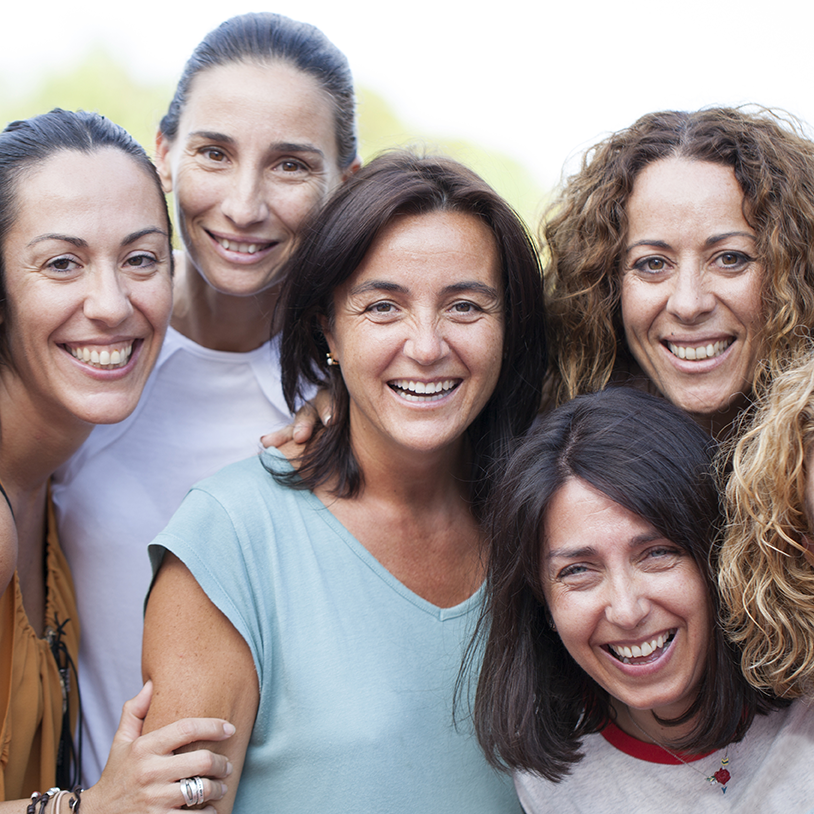
If you or someone you know needs help, call our 24-hour Hotline:

